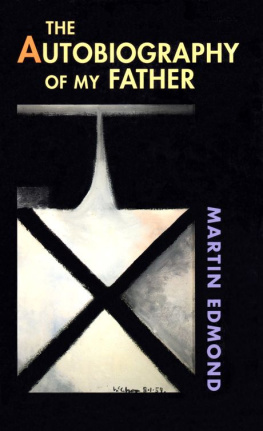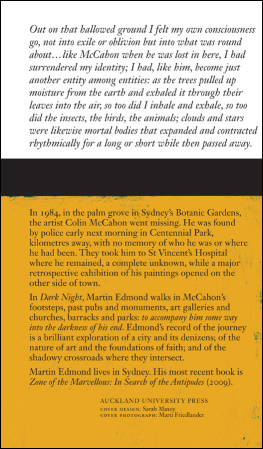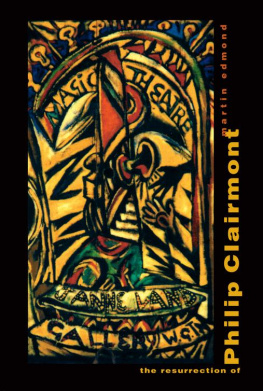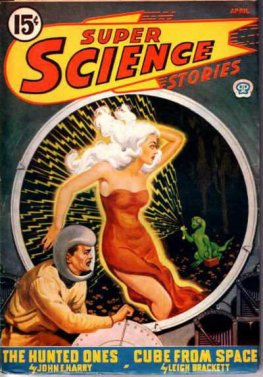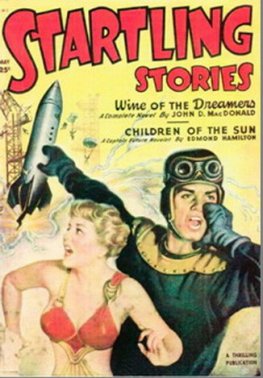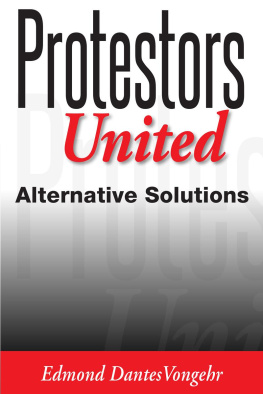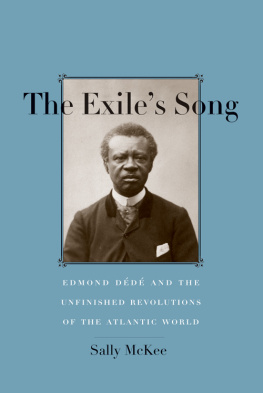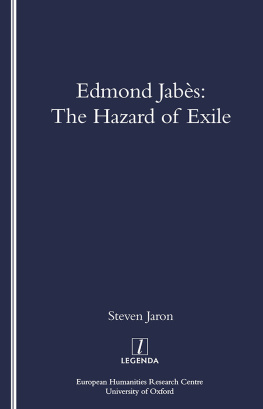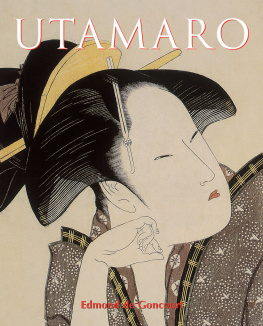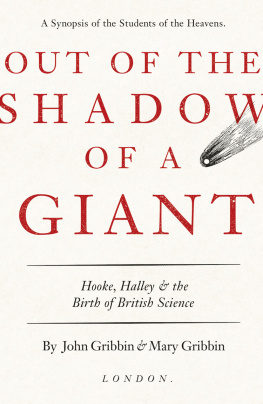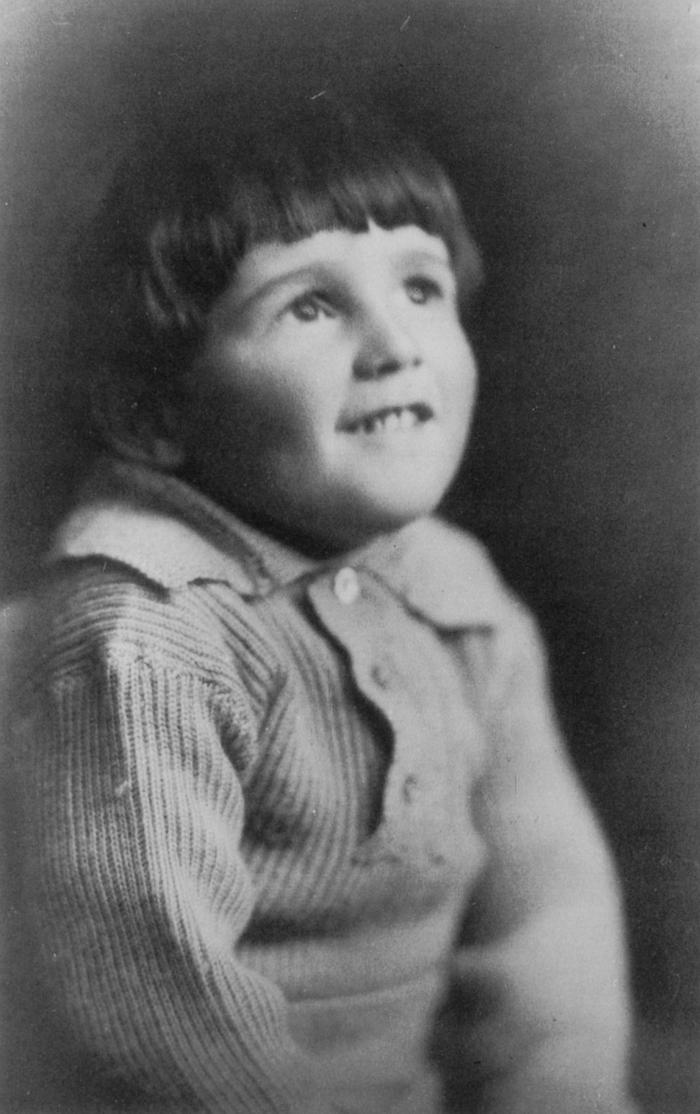My fathers recall of detail of the past, particularly dates, is sometimes inaccurate. I have chosen not to correct these errors. However, some of his remarks have been excised on legal advice. They refer to people in Upper Hutt whose activities he felt contributed to the loss of his job. I regret that the law in this case protects those I would rather see exposed.
The first journey is from Katoomba in the Blue Mountains to Jenolan Caves. We walked. Just Colleen and me. Its about forty kilometres and it took three days. There used to be a bridle path called the Six Foot Track and the current route follows this most of the way. We really werent prepared. It was November and hot and we had packs on our backs. We had been advised to carry water and so had also two three-litre plastic juice bottles. Id boiled the water. It was sweet, with just a hint of apple. And it became clear by about lunch time on the first day that there was not enough of it.
The taxi we took from the station dropped us off at the Explorers Tree at ten on a fine, hazy morning. From the edge of the plateau it is a rapid descent into the valley below. You walk a thousand feet down a very steep track, through bush and fern, past Bonnie Doon Falls to Nellies Glen. Trickles of water ran over mossy stones. Brown and yellow butterflies danced in shafts of vertical sunlight. There were places where the original sandstone culverts, a hundred years old, still survive. The kneecap I injured twenty years ago was soon feeling the strain of the pack on my back, so my whole leg trembled when my full weight came down on it. And Col, with her dicky ankle bone which mutated as she drove across Europe into the clouds of Chernobyl gas in 1986, felt similarly tentative. But we were both excited to be setting out at last.
We hit the floor just as the heat of the day did and walked through the furnace dust of the Megalong Valley for the rest of the morning. This part is farmland and infested with dung flies. You piggy-back them, or they ride on your hat and raid the corners of your mouth and eyes for moisture. I remember them on the back of your checked sports coat, the one with the leather buttons, when you visited me in Chippendale in 1982. How they worried you. You batted at them with your hands and complained as if at a personal insult. Well, they were much worse out there, believe me.
But it was quiet and we didnt see a living soul and since we were still quite fresh, it was lovely to stretch out and swing along the road. The blue bush and orange crumbling bluffs lay along the horizon on either hand under a pale sky. We took our first stop at a ford where there had once been a town with a store and a school. Now it was only farm paddocks and the foundations of gone buildings. The horses wore strange, white, fringed masks, for the flies I think, and Col waded across the creek to give one of them an apple, while I wet my face and hair in the water.
We left the valley floor then and walked through rolling country, up hill and down dale, towards the old graveyard where we thought wed lunch. We never found it, but sat instead under a tree at the edge of a plantation and ate our spinach salad before continuing on into the afternoon. There was no shade now, just heat and dust and the brown road twisting up to the stockyards and over and down and then up again. Our packs were pulling down our backs, our legs were leaden and sore, the water we drank didnt seem to be enough to replace the quantities of sweat pouring off us. Plus one of the bottles had sprung a leak. A strange contradiction loomed here, because it isnt as if this is a desert. There are rivers. Its just that youre not supposed to drink from them. Sewage, or run-off from the farms, or giardiasis or .
About mid afternoon we finally left the farmland behind and entered a grassy, open, wooded country tending down to the valley of the Coxs River. Here is the last remaining section of the original bridle path and it was possible to imagine riding leisurely through the light and shade of the eucalypts in Edwardian dress, on your way to the caves. We were eager now for a glimpse of the river and at last it came, silver through the grey-green trees. We shrugged off our packs, our socks and shoes, most of our clothes and skittered across hot, white sand between enormous boulders towards the water. Then we saw them: the criss-cross scribble pattern of snake tracks in the sand. It was a veritable snake pit. And they swim as well. We had our sticks and our snake-bite kit but we are city people now and felt pale and vulnerable, between the lethal sun rays stabbing down through ozone-depleted air and the secret world of poisonous reptiles we had entered. One track led directly to a black triangular crevice in a rock. Walking past only a metre or so away on my bare feet, I felt rather than saw snake eyes in the darkness.
Col just dangled her legs in the river but I immersed my whole body in the cold, black water flowing swiftly past and over huge, round rocks until I felt the chill banish the accumulated heat of the days walk from my bones. But I still wouldnt drink it and I still felt parched and dry inside, a rage of thirst.
It was incredibly difficult to resume clothes, socks, shoes, pack and walk on the next kilometre or so to the river crossing and the camping ground, but we did. Negotiating the shallow, swift-flowing rapids I felt as if every cell in my body was crying out for water and looked in disbelief at the river running by. I felt like Tantalus in the old story, the water retreating when he bent to drink. We made camp on the other side, boiled the billy and had a cup of tea, then another, and another, and later ate stew beside our tent as evening fell around us and flocks of sulphur-crested cockatoos screeched in the she-oaks.
And all that day the promised south-westerly change sighed intermittently into our toiling faces. There were cool exhalations of wind every twenty minutes or so, a slow drift of cirrus up the sky-blue sky, a hazy thickening in the western air. As we had our after-dinner chocolate and drank brandy from tin mugs we could hear it soughing in the trees like giants breath, talking about tomorrows journey on.
Next morning the prospect of some nameless sickness in the water seemed less to be feared than another days torture of thirst, so after we packed up I filled one of our bottles from the river not the Coxs, which we had been specifically told not to drink, but from Murdering Creek, a small tributary that joins it at the camping ground. And then we set off.
We left the river, the birds, the grass, the shade, instantly behind and, accompanied again by hundreds of flies, struggled up a bare, rocky road in the percussive heat. This day was one of the hardest I have known. My lungs are in good shape since I stopped smoking, and I swim and I walk a lot and so on, but this was something else. The pack on my back felt like it was full of bricks and my legs were so stiff and sore from the day before they hardly worked any more. And having to carry water as well was just too much. I wanted to jettison something, but what? We couldnt lose the tent or the food or the water; wed only brought one change of clothes and what if the weather broke? The thing was, we had to cross a range of hills and then climb up another. We thought, from the absurdly sketchy tourist map we carried, that we had to go up a thousand feet, down a thousand, up a thousand. It wasnt until we got to Jenolan and looked at a proper map that we realised it wasnt feet, it was metres! A thousand metres! In a way, its just as well we didnt know: it probably would have killed us.

